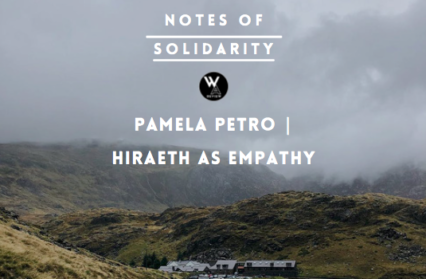Notes of Solidarity is a new daily series of mini-essays, poems, and reflections on the Russian war on Ukraine by some of Wales’s leading literary figures. Here, American author and artist Pamela Petro considers the universality of hiraeth and how it might be a vehicle for empathy amidst the current crisis in Ukraine.
I stood on the shores of Llyn Celyn, squinted hard, and tried to conjure the vanished homes of the Tryweryn Valley. I walked the Epynt Way and attempted to imagine a peaceful community of farmers and shepherds—tried to will away the vast BOOMS of artillery practice over the brow of the hill. I visited Aberfan on the 50th anniversary of the day that a million and a half cubic feet of coal slag inundated the town, and struggled to kindle the 116 children who were killed back to life: children who’d been born more or less the same year that I was. I made a pilgrimage to Narberth to find the mound where Manawydan and his friends had sat in the Third Branch of the Mabinogi, calling down terrible magic in the form of thunder and mist. When it lifted, they say, every part of their world had vanished except for the land under their feet.
I did these things because I was writing a book about hiraeth—my hiraeth and the hiraeth suffered, endured, mythologized and remembered by the Welsh nation. That book, The Long Field – Wales and the Presence of Absence, A Memoir, came out last autumn, and after nine years of hard work I took a breath and thought, well, OK, hiraeth, with all your losses and longings, your exiled and displaced: maybe I don’t have to think about you for a while. How very wrong I was. Because now I don’t have to hike or walk or drive to the Valleys or Narberth—I don’t even have to leave my home in Massachusetts to go to Wales. All I have to do is turn on my TV to see images from Ukraine—families going about their lives one day, invaded and bombarded the next, mourning, running for safety, running for cover, their homes, their cities destroyed and reduced to rubble all because they live in a country that shares a border with Russia. And to Vladimir Putin, that’s a crime.
Hiraeth, says Robin Chapman, is both very Welsh and universal at the same time. Let both of its qualities unite us, and make it a source of urgent empathy for those most in need of our support, even if all we do is remember that on the other side of hiraeth is hwyl—not the present absence of love and home and safety, but their fierce inhabitation of the present moment, when spirits will again soar.
For more information on the Russia-Ukraine war, including ways you can help, please click here.
You can follow all contributions to Notes of Solidarity from Wales Arts Review here.
Supported by:












